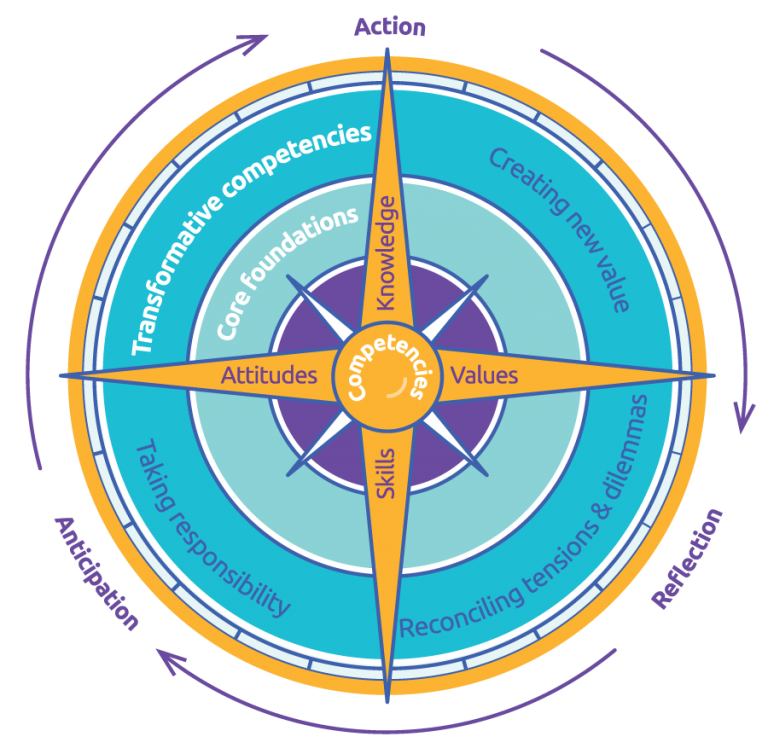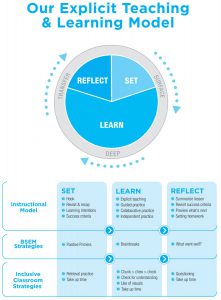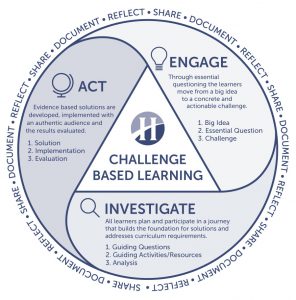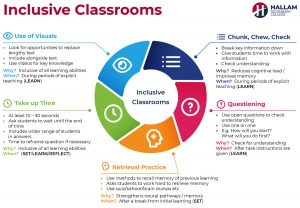Our Vision and Values are translated into action through our Learning Compass.
Our curriculum framework uses the metaphor of the “learning compass” to show the types of competencies students need to successfully navigate towards the future we want, individually and collectively.
Just as a compass orients a traveller, the Learning Compass indicates the knowledge, skills, attitudes, and values students need not just to weather the changes in our environment and in our daily lives, but to shape a positive future.
Our Learning Compass focuses on:
- Attitudes and Values – the principles and beliefs that influence a student’s choices, judgements, behaviours and actions
- Core Foundations – literacy and numeracy, health and, moral and ethics
- Skills – the academic, practical, physical and social and emotional skills young people need to fulfil their potential
- Student Agency – student’s capacity to set goals, and reflect and act responsibly
- Wellbeing – individual and collective student wellbeing
- Transformative competencies – enabling students to create new value, reconcile tensions and dilemmas, and take responsibility for their future
- Knowledge – the disciplinary, interdisciplinary, epistemic and procedural knowledge that students need to engage with lifelong learning

Literacy, Numeracy and Health
We know that success in life comes from being highly literate, numerate and healthy so our curriculum programs privilege English, Mathematics and Physical Education and Wellbeing. Students at the College spend more instructional time on these three areas than in similar schools.
Our curriculum structure has an unswerving focus on learning knowledge and skills underpinned by the Victorian Curriculum in Years 7 to 10. Our Senior students are able to access a wide range of VCE and Applied Learning Programs including University enrichment courses and HeadStart as part of a three-year pathway to success.
The College has three Centres of Excellence that enrich and extend the curriculum. These are;
- Sports Academy
- Creative Arts and Performance Academy and,
- Technology Innovation Academy
Students in the Junior Years will have access to the Centres of Excellence and can enrol in the programs for their Senior Pathway.
Our Senior students can access the co-located Hallam Valley Trade Training Centre which provides a wide range of applied learning courses on site.
Reporting of Student Achievement
We report student achievement to parents and carers throughout the academic year. Progress reports, which communicate student learning habits, including effort, organisation, behaviour, and performance are distributed to all parents and guardians once a term.
In line with DET guidelines, the school reports student achievement in all learning areas against the Victorian Curriculum standards twice a year using the prescribed five-point scale indicating whether students are well below, below, at, above or well above the expected level. Achievement in specific learning areas is also reported using specialised programs and assessment tools including PAT R and PAT Maths, NAPLAN, and VCE achievement data.
We use continuous feedback to students, parents, and carers through the COMPASS Learning Management System. Teachers provide feedback on common tasks that assess student progress in their program.
Our Instructional Model
Explicit Teaching and Learning
At Hallam Secondary College we use our ‘Explicit Teaching and Learning Model’ (ETLM) to teach new knowledge. The ETLM is used for all English, Mathematics and Health and Physical Education classes.
The ETLM includes the ‘Set, Learn and Reflect’ three part lesson, our Berry Street Education Model strategies and Inclusive Classroom strategies.
Inclusive Classroom Strategies
At Hallam Secondary College we use Inclusive Classroom strategies to assist all students in learning. These evidence-based strategies support all students to access the information they need in a manner that suits them and sets them up for success in the future.



